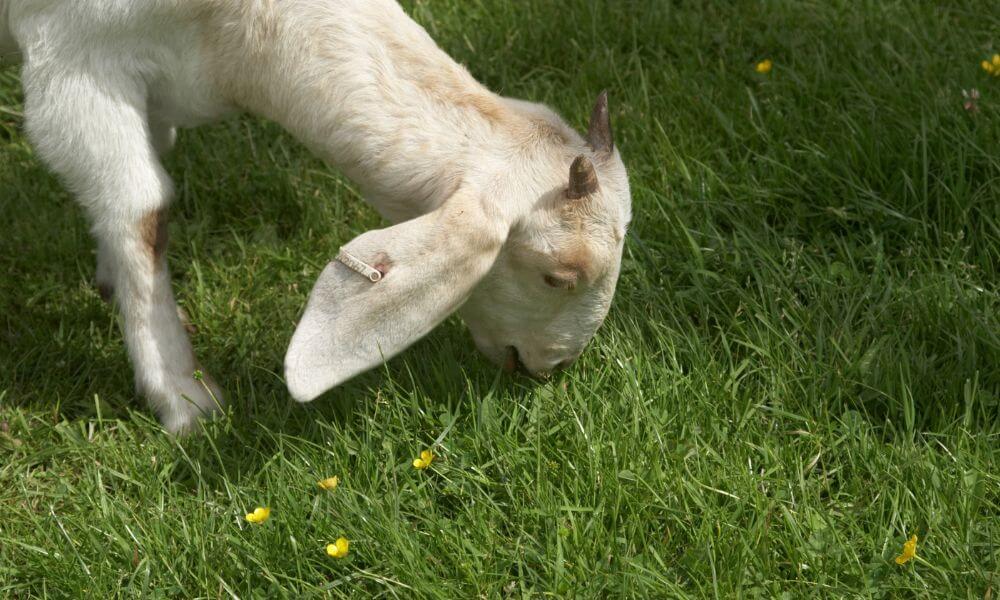This has a lot of implications for how best to treat CL and how best to avoid your goats getting in the first place.
Overall, CL is typically not a deadly infection and your goats will pull through, but in some cases, it can be fatal.
Let’s look at this in more detail.

How is CL transmitted in goats?
Firstly, the bacteria will come from somewhere external.
It’s not always clear where, although it could be from plant matter or other food sources.
Once the first goat has been infected, the bacteria will then make its home somewhere inside the goat.
Whether through a wound or entering through a mucus membrane, once it’s in, the goat is infected and can then pass the infection on to other members of the herd.
This transmission will continue to work in the same way.
For it to pass to another goat, it will need to be through the mucus membranes or through an open wound.
Close contact is typically required—the bacteria is not in any way airborne and it cannot travel.
All of this said, after first contact, symptoms can take a long time to appear.
Sometimes, up to six months will pass before you notice anything.
At least two months will go by before the animal shows any signs.
At the first sign of infection, move the goat away from the rest of the herd.
Allow the infection to run its course, and treat the goat along the way—consult a vet for how best to do this.
Then, you can return the goat to the herd.
Is CL common in goats?
There are two forms, first of all, of this infection.
One is internal and the other external.
The internal infection is much less common in goats than it is in sheep, and vice versa.
But both types are fairly common to both creatures, and any goat owner stands a good chance of needing to deal with this problem at some point in their lives.
Overall, though, it’s not a massive cause for concern.
It’s common, but not guaranteed in every goat’s lifetime.
As I said, you’ll want to be more on the look out for the external infection—cysts, lesions, any pus on the skin.
These are all signs of CL.
What happens to an infected goat, then?
Does CL in goats go away?
Generally, yes, it will go away eventually.
The mortality rate has been shown to be very low for goats with this infection.
One study recorded only 3.9% of goats dying from the infection.
The other thing to mention, though, is that there is really no specific treatment for CL in goats.
You can’t just use veterinary science to whisk the infection away.
You are going to have to let it run its course before your goat will be free of it.
During this time, though you can’t treat the infection directly, you will need to treat the rest of the symptoms.
Be sure to regularly clean the wounds and cysts, give them medicated food, and just make sure they are generally doing okay.
You’ll need to separate them from the rest of the herd, and they will get lonely by themselves.
Try to check in on them as much as possible.
Wearing some form of PPE is a very good idea.
It’s extremely, almost vanishingly rare, but goats can pass CL to humans.
It manifests in us much as it does in goats—fevers, high temperatures.
Can we protect our goats against CL, then?
Should I vaccinate my goats for CL?
There are some commercial vaccines available that seek to give your goat greater protection against these kinds of infections.
However, there are some important caveats.
Firstly, there is no CL vaccine.
As I say, the vaccines available seek to prevent a wider range of infections.
On top of that, the effectiveness of the available vaccines is quite limited at the moment.
There is no guarantee it will prevent infection or serious illness, it’s just a bit of added protection.
The best thing to do is discuss options with your vet.
Science is always changing in this field, and you may well find something new on the horizon.
CL is no joke, then, and you should take it seriously—at the same time, you shouldn’t kill yourself with worry over it.
Most of the time, with the proper care and treatment, your goats will get over it without any problem.
When an infection strikes, separate the infected goats and make sure to thoroughly clean everywhere.
Check your goats for any abscesses or cysts, and keep them generally clean to avoid the infections spreading.
